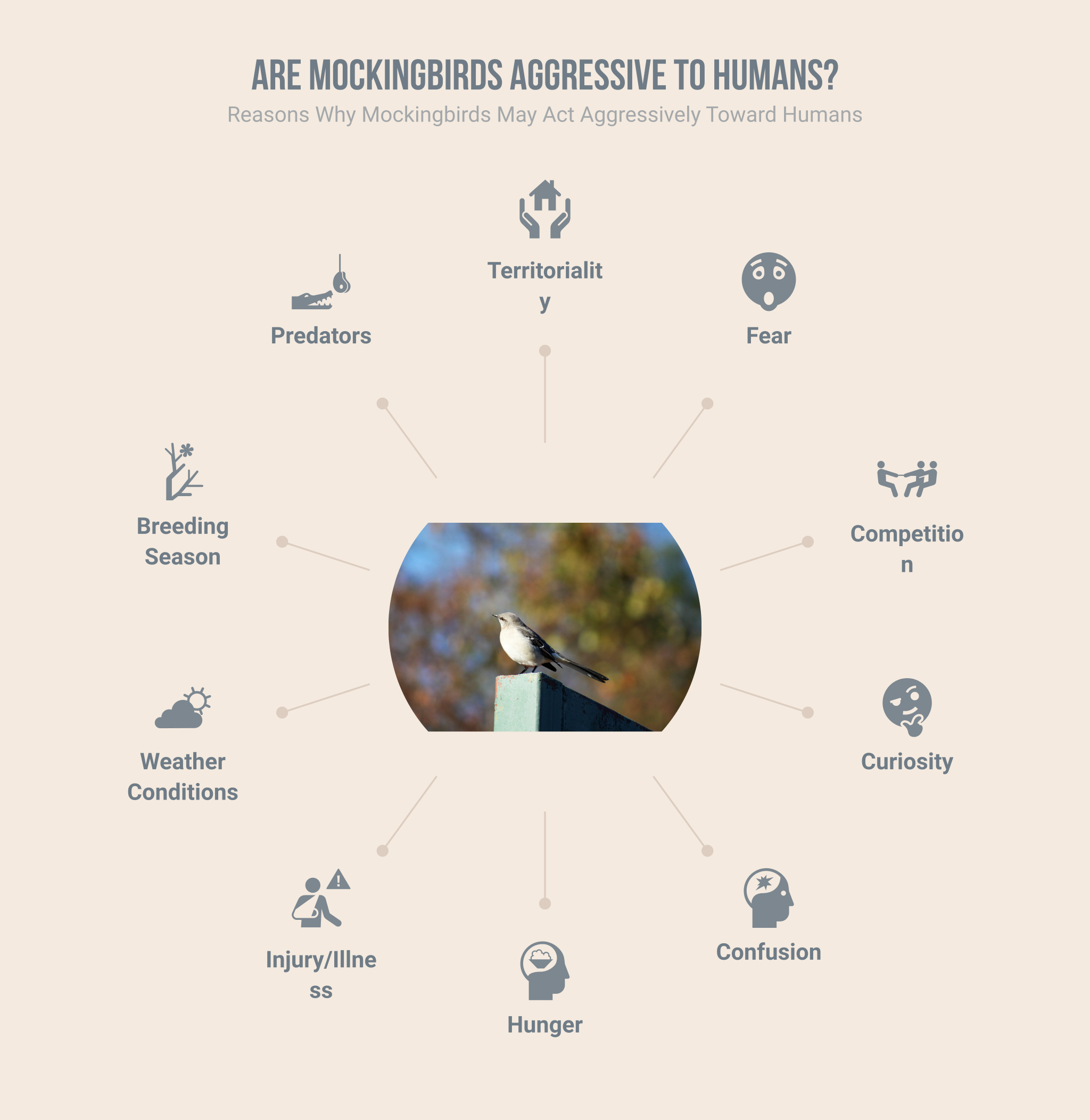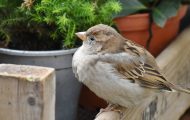Mockingbirds have long been known for their melodic and beautiful songs but have you ever wondered are mockingbirds aggressive to humans? This avian species is mainly territorial, fiercely defending its nesting ground by confronting other animals and potential intruders.
But what about humans? In some cases, mockingbirds may diversify their defenses toward individual people to protect their young from perceived threats. While the birds buzzing around us often appear docile, with closer inspection. It can become apparent that mockers may display aggression towards humans if disturbed or threatened in any way. Let’s discuss this matter further about mockingbirds behavior and characteristics.
Get to Know the Mockingbird
 Type image caption (optional)
Type image caption (optional)
If you’ve ever spent time outdoors in the United States, you’ve likely heard the melodic chirping of a mockingbird. But what is a mockingbird, exactly? And why are they so common throughout North America? Let’s dive into the wonderful world of mockingbirds and explore!
What Exactly is a Mockingbird?
The Northern Mockingbird (Mimus polyglottos) is a species of bird native to North America. It is about 9-11 inches long, has gray feathers with white patches on its wings and tail, and can live up to 13 years in the wild. It gets its name from its impressive ability to imitate other birds’ songs (and even mechanical sounds like car alarms!) The mockingbird has been known to learn up to 200 songs over its lifetime!
Where Are They Found?
Mockingbirds are most commonly found in areas with plenty of trees and shrubs, such as suburbs, parks, gardens, and woodlands. They also tend to prefer warmer climates over colder ones. While native primarily to North America, mockingbirds have been introduced in Hawaii, Bermuda, Mexico City, and some parts of Europe.
What Do They Eat?
Like many other birds, mockingbirds mostly feed on insects such as spiders, grasshoppers, beetles, caterpillars, and crickets during the spring and summer. When these insects aren’t available or abundant enough for their needs in the winter. They supplement their diet with fruits like berries and figs.
Are Mockingbirds Aggressive to Humans?
 Type image caption (optional)
Type image caption (optional)
If you’ve ever encountered a mockingbird during your outdoor activities, you may have noticed that it can be bold and aggressive. But why? It turns out that there are several possible explanations for their behavior. Here are some reasons why mockingbirds may act aggressively toward humans.
1: Territoriality
Like many birds, mockingbirds are known to be territorial. Especially during mating season when they are trying to protect their nests from potential predators. They often respond to intruders (like humans) with loud chirping and flapping wings to scare them off.
2: Fear
Even though mockingbirds don’t always show it, they can also be scared of humans. When a human comes too close or moves too quickly, the bird may react by flying away or attacking to protect itself.
3: Competition
In some cases, mockingbirds may view humans as competition for food sources like worms or insects. This is especially true if the bird has been trained to expect a food reward after performing certain behaviors (such as singing).
4: Curiosity
Some birds may simply be curious about humans and want to get closer to investigate further. However, this curiosity can quickly become aggressive if the bird feels threatened by the human’s presence or movements.
5: Confusion
Mockingbirds can get confused when they see a human moving quickly through their territory and mistake them for prey or an intruder that must be chased away or attacked to protect the nest or territory from harm.
6: Hunger
In extreme cases of hunger, some birds could become desperate enough to attack humans if they think there might be food nearby (even if there isn’t).
7: Injury/Illness
An injured or ill bird may become more aggressive due to pain and discomfort, leading them to lash out at anything approaching them—including humans who come too close for comfort!
8: Weather Conditions
Hot temperatures, strong winds, and other inclement weather conditions can cause stress and agitation, leading some birds to act aggressively toward humans and other animals in their environment.
9: Breeding Season
During the breeding season, male mockingbirds will often become more protective of their territory to attract mates and ensure successful nesting attempts, so any intruders—including humans—could trigger a defensive response from the birds to keep them away from their nests/eggs, etc.
10: Predators
If a mockingbird has spotted a predator in its vicinity, it may act aggressively towards any potential threats—including humans—to protect itself from potential danger!
Mockingbirds can be bold and aggressive when protecting their territory or themselves from perceived threats. If you ever encounter a mockingbird, the best thing to do is remain calm and respect its space by giving it plenty of room to move away if necessary.
Common Aggression Tactics Used by Mockingbirds
 Type image caption (optional)
Type image caption (optional)
How do mockingbirds show aggression? Let’s take a look at the common aggression tactics used by mockingbirds.
▶Posturing and Preening
When a mockingbird is confronted by something that poses a threat, it will often puff out its feathers and stretch up tall to appear larger. The bird will use this form of posturing to intimidate the intruder. In addition, it may also engage in preening while facing its opponent, which involves fluffing up its feathers and making itself look even larger.
▶Chasing
One of the most common aggression tactics mockingbirds use is chasing away intruders from their territory. The bird may circle the intruder several times before finally shooing them away with high-pitched calls or chirps. It’s not uncommon for the mockingbird to continue chasing after an intruder long after it has also left its territory!
▶Distraction Displays
Mockingbirds have been known to use distraction displays to draw attention away from their nest or young ones from potential predators. This involves engaging in loud vocalizations or flitting around rapidly while moving away from its nest to create a distraction for potential predators.
▶Alarm Calls
Mockingbirds will also use alarm calls when confronted by an intruder on their territory or when they spot potential danger nearby. These calls are typically loud and high-pitched and are meant to alert other birds of potential danger while also scaring away any intruders who may be present.
▶Physical Attacks
In some cases, mockingbirds may resort to physical attacks (dive bomb ) if they feel threatened enough by an intruder on their territory or a potential predator near their nest or young ones. The bird will repeatedly dive at the intruder with wings spread wide open to scare them off!
These are just some of the more common aggression tactics that mockingbirds use when defending their territory or protecting themselves. It’s important to stay calm and respect a mockingbird’s space if you encounter one, as they can be quite aggressive when provoked.
How to Get Rid of Mockingbirds
Fortunately, there are a few simple steps you can take to discourage such behavior from mockingbirds.
✔️Put up a Scarecrow
One of the simplest methods for discouraging aggressive behavior from mockingbirds is to put up a scarecrow in your yard. The sight of a scarecrow may convince the birds that other predators are nearby, so they will stay away from your property. Place the scarecrow facing away from the birds’ nesting area so that it doesn’t intimidate them too much and cause them to leave permanently.
✔️Hang Reflective Objects
Another way to discourage aggressive behavior from mockings is by hanging reflective objects near the birds’ nesting area. This will frighten them away without causing physical harm or disrupting their home or family life. You can use anything shiny or reflective such as old CDs, aluminum foil, mirrors, or even Mylar balloons filled with helium gas (which make an interesting visual effect).
✔️Plant Native Plants
Mockingbirds are attracted to native plants because they provide food and shelter for their young ones and attract other animals they can feed on. Planting native plants around your yard could help draw mockingbirds away from areas where you don’t want them to nest or congregate, such as near windows or sidewalks where people might be disturbed by their dive-bombing tactics. Make sure you research local plant species before planting!
✔️Play Loud Noises
Playing loud noises through speakers is another way to discourage aggressive behavior from mockingbirds without causing any harm or disruption to their home life. Playing sounds such as thunderstorms, car horns, sirens, etc., may convince the birds that larger animals are invading their territory and cause them to move on elsewhere in search of safer ground for themselves and their young ones.
✔️Utilize Water Sprays
You can also utilize water sprays around areas where you don’t want mockingbirds perching around – near windows or porches that are constantly visited by humans – spraying water at them when they come close will help discourage them from coming back again! You won’t need a lot of water either; just enough so that it makes them uncomfortable enough not to linger around any longer than necessary!
✔️Provide an Escape Route
Mockingbirds may attack when they feel threatened or cornered with no way out. Make sure you provide an escape route for them by keeping vegetation trimmed away from the areas around bird feeders and nesting sites. This will make it easier for them to fly away if they feel threatened.
✔️Offer Multiple Feeding Sites
If you’re feeding the birds in your yard, make sure you offer multiple feeding sites so that there aren’t too many birds competing for food in one spot. This will help reduce the competition and aggression between birds battling over resources at a single location.
✔️Keep It Clean
Keeping your bird feeders clean is critical in discouraging aggressive behavior in mockingbirds—or any wild bird species, for that matter! Dirty feeders can spread diseases amongst the flock, which can cause even more issues with aggressive behavior as birds battle over food sources while sick or weakened by disease.
✔️Install Nest Boxes
Installing nest boxes to encourage nesting can help keep mockingbirds out of unwanted areas like trees or shrubs near your home, where they may become more territorial or aggressive due to their proximity to human activity and noise levels from traffic or construction work nearby.
✔️Be Patient
It’s important to remember that all animals—even wild ones—need time to adjust to changes in their environment before they can be expected to act in accordance with our expectations of them as pet owners or wildlife observers. Give your mockingbirds time and space before expecting them to change their behaviors.
These are just a few methods to discourage aggressive behavior in mockingbirds. Remember, it’s always best to take preventive measures first before trying any more extreme measures that could cause harm or disruption to the birds and their habitat.
The Benefits of Having Mockingbirds
Although mockingbirds can sometimes be aggressive, they are beneficial to have around.
🔴Attracts Other Birds
Mockingbirds are great at attracting other birds to your yard. They sing loud and often sing, making them an attractive choice for other birds looking for mates. If you want more birds (and more singing) in your yard, getting a mockingbird is a great way to do it!
🔴Natural Pest Control
Mockingbirds help keep pesky pests away from your garden. They love to eat insects like beetles and grasshoppers, so they’ll help keep those bugs away from your vegetables and flowers. Plus, if snakes or rodents lurk about, these birds will also scare them off with loud calls.
🔴Protects Against Predators
Mockingbirds aren’t just good at keeping pests away from your garden; they’re also great at protecting other birds from predators. If another bird starts to get attacked by a hawk or owl, the mockingbird will swoop in and start attacking the predator. This helps protect all other birds in the area and ensures their nests remain safe and undisturbed.
🔴Provides Natural Beauty
Having a mockingbird around adds beauty to your yard or garden through its unique plumage and intricate songs. The bright colors of these birds will add life and vibrancy to any outdoor space while their melodious songs fill the air with music that can be enjoyed by all who listen!
Frequently Asked Questions
Do mockingbirds attack?
Mockingbirds will rarely attack humans or pets unless they feel threatened or scared. If you approach a nesting area or are too close to the birds’ nest, they may fly at you and flutter their wings. That said, this behavior is generally not aggressive—it’s just meant to scare away potential predators from their young.
What does it mean when a mockingbird comes to you?
In general, seeing a mockingbird can be seen as a sign of new beginnings and positive change in your life. According to Native American folklore, if a mockingbird visits you or appears in your dreams, it can symbolize that an old problem is being resolved and replaced with new opportunities. Seeing the same mockingbird multiple times could even signify that something special is coming your way!
Do mockingbirds sing?
Yes, as mentioned above! Mockingbirds are known for their singing ability—they typically learn up to 200 songs to attract mates and defend their territories. They often take inspiration from other birds in the area and imitate them with astonishing accuracy. A single song can last up to 10 minutes!
Are Mockingbirds friendly?
Mockingbirds can be friendly towards humans, especially if you feed them regularly. They may even perch on your shoulder or follow you if you give them enough food. However, it’s important to note that these birds can become aggressive if threatened. If you make sudden movements or come too close, a mockingbird may dive-bomb or peck at you to scare you away.
Are Mockingbirds aggressive to other birds?
Mockingbirds are quite territorial and will defend their nests aggressively against intruders, including other birds. They are also known for “mobbing”—swooping in circles around predators such as hawks or owls until the predator leaves the area. In some cases, mockingbirds even go so far as to attack the predator physically!
Why do Mockingbirds attack cats?
Cats pose a serious threat to bird populations because of their natural hunting instinct; however, mockingbirds tend to dislike cats and will often aggressively defend their territory from them. This is likely because cats are bigger than most of the other animals that mockings encounter daily—so they see them as more of an immediate threat than smaller creatures such as squirrels or chipmunks. Cat owners must protect their pets from mockingbird nests during nesting season (April through August).
Final Words
Now that we have answered the question, “are mockingbirds aggressive to humans?” Well, they may be territorial and protective of their nests. ut are generally not aggressive towards humans. They will usually only become aggressive if they feel threatened. However, if they become used to regular contact with humans, they can become friendly and even perch on your shoulder or follow you around.




